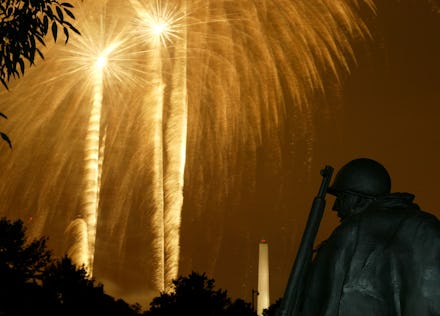For many, fireworks are the highlight of 4th of July. For those with PTSD, it’s a different story.

Among the American flags and patriotic symbols, Americans across the country might spot a different sort of decoration this Fourth of July: Yard signs that clearly state, “Combat veteran lives here: Please be courteous with fireworks.”
These signs, which have been distributed by the organization Military with PTSD since 2015, point to one of the lesser-known consequences of America’s Independence Day celebrations — that the fireworks Americans set off to show their patriotism can be devastating to those who have done the most to serve the United States.
For military veterans and others who suffer from Post-Traumatic Stress Disorder, fireworks can be a triggering event, catapulting survivors back to moments of trauma and becoming a source of confusion and fear rather than happy celebration.
“Dealing with all those explosions and then coming back home to regular life was very difficult with people doing fireworks,” U.S. Marine Corps veteran Jerry Bacanskas said in an interview. “Anyone who has PTSD ... if you’re not expecting [the fireworks], as soon as that happens, you start having an emotional reaction to it — your adrenaline rushes ... you immediately go into a state of panic. It’s just a very difficult thing.”
PTSD is a widespread problem both inside and outside of the armed forces: According to the U.S. Department of Veterans Affairs, 7% to 8% of all Americans will have PTSD at some point in their lives.
“Fireworks cause loud noises that we don’t see coming,” Jon Hochstat, a civilian who suffers from PTSD caused by gun-related trauma, said in an interview. “For me, the sound of fireworks are very real and very tied to a specific event.”
In the military, approximately 11% to 20% of those who have served in Iraq and Afghanistan have the disorder, along with approximately 12% of Gulf War veterans and 15% of Vietnam War veterans.
The way in which these numerous Americans manifest their disorder can vary wildly. “There’s many, many, many different ways in which PTSD can express itself,” Rafael Noboa y Rivera, a U.S. Army veteran with PTSD, said in an interview.
“There’s sort of this popular stereotype based upon really bad popular culture, in which, you know, ‘Oh, somebody has PTSD, there’s fireworks, that person’s going to hit the deck.’ That’s not necessarily the case for everybody,” he said.
While Noboa y Rivera notes that his disorder manifests as becoming much more alert and hyper vigilant, others can respond far more destructively. One Wisconsin veteran was jailed because he shot a gun into the air after being triggered by fireworks in 2016, while a 27-year-old veteran in Georgia took his own life after hearing fireworks in 2015.
Because of these potentially catastrophic effects, it’s crucial for Americans to think before they kick off their pyrotechnic displays this July. That doesn’t mean Americans should avoid fireworks altogether — what Military with PTSD founder Shawn J. Gourley calls the “biggest misconception” of the organization’s sign campaign — but rather give neighbors and those nearby a “courteous heads up” if they might not expect fireworks to take place.
“This isn’t about July Fourth,” Gourley clarified. “The veterans know fireworks are coming that day, and they’ll be prepared to stay inside and ... do what they have to do. They want people to be patriotic and celebrate the holiday. This is about the days leading up to and following the Fourth.”
Indeed, for those who suffer from PTSD, it’s not so much the fireworks themselves as their often unexpected nature.
“When you don’t know what it is or where it’s coming from, your brain doesn’t think very rationally,” Hochstat explained. “If I don’t know something’s coming, it’s brutal.”
Because of this, smaller fireworks that individuals set off near their homes are particularly triggering, the veterans stress, as opposed to large, public fireworks displays that are more clearly announced in advance.
“We understand that it’s the Fourth of July and that fireworks are a big part of that celebration. ... It’s part of society and we have to deal with that,” Bacanskas said. “But people setting off private fireworks — firecrackers, M80s, whatever it may be — they do it on their block or in their neighborhood. A lot of times the veteran, if they’re around, they’re not going to know the people are doing that.”
For those thinking about setting off fireworks over the holiday, Southern New Hampshire Health suggests sticking to celebrating between Monday and Wednesday, alerting your neighbors beforehand and only lighting them within two hours past dusk.
The social aspect of reaching out to veteran neighbors is also important to keep in mind, Gourley stressed, noting that one of the biggest impacts the organization’s sign campaign has had is allowing veterans to build connections with their neighbors and find a sense of community.
“What I want to communicate to people, more than anything, [is] respect and kindness,” Gourley said.
Whether Americans want to foster a friendship or simply give a polite heads up, though, simply making the effort to communicate is key.
“If people want to set off fireworks, I think the best thing to do is just to communicate, honestly,” Noboa y Rivera said.
“And I don’t think that’s so much being courteous towards veterans — I think that’s being courteous, period.”